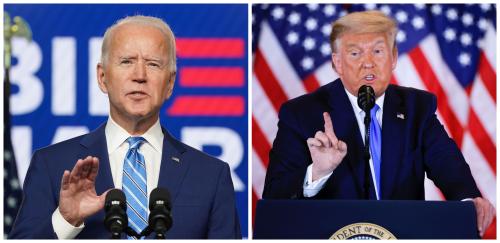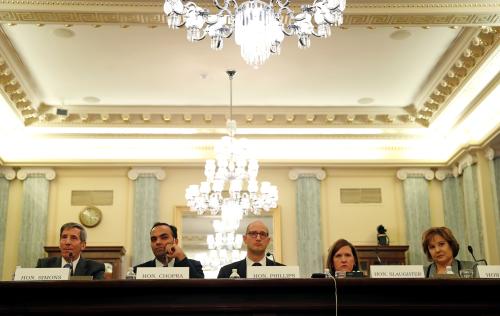“Don’t bother building the transition team,” Donald Trump reportedly told Chris Christie whom he assigned to head that effort, “you and I can leave the victory party two hours early and learn everything we need to know to run the federal government.” Now, four years later, that attitude has delivered to President-elect Biden’s transition team perhaps the most arduous task ever faced by such an effort.
Confronting the Biden transition are five existential crises. The pandemic is surging. The economy is stalling. Social justice is faltering. Climate change is on a rampage. And the government that is essential to dealing with each of these problems has been hollowed out by four years of constant attacks.
And, oh yes, these issues must be dealt with despite a potentially divided government and deeply divided citizenry.
I had the privilege of being involved in the 2008-2009 Obama-Biden transition. My position heading the working group with responsibility for all the federal agencies dealing with science, technology, space, and the arts was an eye-opener to the interrelated breadth and scope of federal activities. At that time, the nation’s attention was consumed by a single existential reality: recovery from the financial crisis and Great Recession. Regardless of the topic under consideration, making plans for the new government began with “how does this help the recovery?” One of my colleagues went so far as to opine that this might be the first transition where an administration’s most important decisions would be made before the new president was sworn in.
The Obama transition was duck soup compared to the challenges facing the Biden transition team. Once again it is necessary to develop a plan for economic recovery. But that is just one of five interconnected existential threats the new leadership will have to overcome. The reality that Americans are dying from a plague is job one. Both economic and pandemic problems have hit hardest where the lack of social justice is felt the most. Hurricanes and wildfires ravage the nation; yet as with COVID-19, science has been denied. Amidst all this chaos, faith in the government’s ability to lead has been institutionally and individually undermined by the person entrusted to run it (who will probably continue the same message when out of office).
Typically, the transition teams do the staff work necessary for the new administration’s first hundred days. Demands on the government do not stop while the new administration fills positions and appointees come up to speed. The typical transition experience is that once the doors open, they are flooded with petitioners seeking “just one thing.”
As a tech policy wonk, I am often asked, “How will the Biden transition handle tech policy?” It is the wrong question. The more appropriate question is how tech policy will help deliver solutions to the existential crises.
I remember a 2008 transition meeting with an industry group. While the issue they wanted to discuss related to their industry, it had a direct effect on every American. One of the group’s leaders demanded, “So what are you going to do about this?” My response was, “You’ve asked the wrong question; you should be asking what you can do to help address this national problem.”
To the extent that new tech-related initiatives emerge from this transition they will have to be far beyond the “just one thing” request. The existential crises facing the United States force us to each grow beyond our self-interests.
This time, the tech transition petitioners need to come with answers in place of asks:
What will tech do to keep people alive and stop the spread of the pandemic?
For instance: What industry leadership will make smart cities smarter for contact tracing and tracking? As COVID drains local treasuries, what will the tech industry invest to make their solutions virtually costless?
Where, how, and how soon will tech act to boost the economy and create jobs?
For instance: What are specific commitments and deliverable dates for new quality jobs and training? What will the dominant digital companies do to share the essential asset of the 21st century—data—with new companies seeking to create new jobs?
How will the tech industry lead in the quest for social equality?
Those hit hardest by the pandemic and economic downturn are also those hit by social inequality. For instance, what is the plan to move beyond interconnections to internet usage, especially in low-income communities? What is the measurable commitment and timeline for aggressive hiring within those communities and the aggressive diversification of corporate boards?
What are the tech-based climate solutions?
For instance: Tech’s big server farms are among the biggest consumers of electricity. What is their measurable commitment to make these facilities carbon neutral?
Will the dominant digital companies support government protection of the public interest through oversight of their activities?
For instance: Big Tech’s “move fast and break things” mantra has resulted in the companies making their own rules for the treatment of consumers and competition. Will they get serious about meaningful public interest oversight of their activities?
Tech policy is no longer an isolated island where policy wonks debate nuances. The “for instance” examples above are just that: examples, not a definitive agenda. Still, the fact remains that tech had a role in getting us into the current situation. What will it now do to get us out?
The Brookings Institution is committed to quality, independence, and impact.
We are supported by a diverse array of funders. In line with our values and policies, each Brookings publication represents the sole views of its author(s).










Commentary
Transitioning tech policy in an existential crisis
November 9, 2020